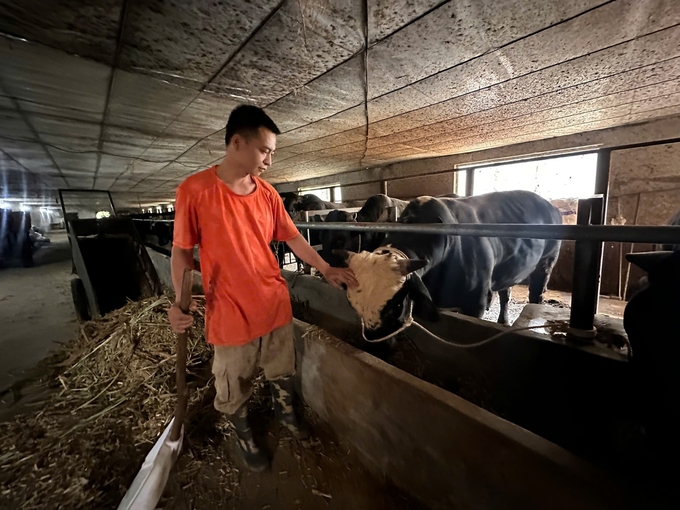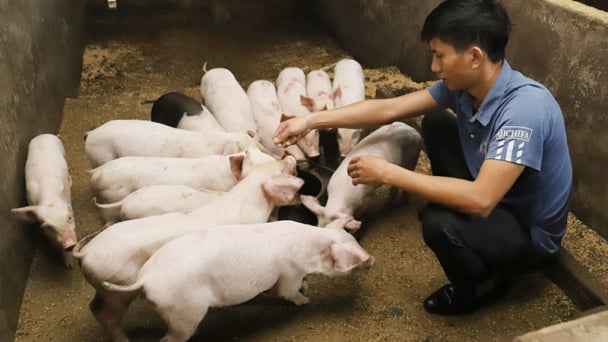June 19, 2025 | 23:58 GMT +7
June 19, 2025 | 23:58 GMT +7
Hotline: 0913.378.918
June 19, 2025 | 23:58 GMT +7
Hotline: 0913.378.918
In 2022, Tran Huu Binh started participating in the Son La Agricultural Cooperative with the desire to build a large-scale cattle farm. Starting from 100 breeding cows, his herd has now grown to more than 400 cows, operating on two farms with a total area of nearly 5,000 m2.

Binh stores vaccines in the refrigerator at a temperature of 2 - 4 oC. Photo: Duc Binh.
Binh’s farm not only focuses on expanding its scale but also ensures strict standards for disease prevention. Every year, in February and August, he fully vaccinates cows against haemorrhagic septicemia, lumpy skin disease and foot-and-mouth disease.
The local Agricultural Service Center provides free support for some types of vaccines, so livestock farmers only have to register the needed quantity. As for lumpy skin disease vaccine, the selling price is supported at a minimum level of nearly VND 30,000/dose.
According to Binh, ensuring vaccination for more than 400 cows costs him over VND 50 million per year. In exchange, the farm has not been affected by disease for two consecutive years. He also hired a technician who graduated from the College of Veterinary Medicine to supervise all vaccinations and monitor the herd’s health conditions. The technician will examine the cows as soon as he detects any illness and prescribe a treatment regimen to prevent disease spread.
On August 9, Mai Son district issued a directive requiring departments to strengthen communication and mobilize households to vaccinate their livestock against lumpy skin disease through the form of socialization. The goal is to have over 80% of the total herd in the commune vaccinated by the end of August.
According to Nguyen Ngoc Toan, Head of Son La Sub-Department of Livestock Production, Animal Health and Fisheries, large farms like Binh’s always meet the requirements of vaccination sessions and complete them on time. However, some small-scale farms have not yet complied. The Sub-Department has thus organized inspection teams to monitor and urge the work of disease prevention and control specifically vaccination. Reports on the disease situation and vaccination results are also fully updated.
As of early October 2024, Mai Son district had two outbreaks of lumpy skin disease in Na Bo commune and Chieng Chan commune. Veterinary staff instructed people to perform disinfection and isolate sick animals.
The commune-level People's Committees directed the villages and called for cattle raising households to organize the vaccination for lumpy skin disease in the direction of socialization. Four infected cows were isolated and monitored, including three cows in Na Bo commune and one cow in Chieng Chan commune.
Pasteurellosis vaccine was injected into all cows in the area, the rate of vaccination for foot and mouth disease reached 83.11%, lumpy skin disease vaccine for cows was socialized with 2,638 doses, reaching 7.96% of the total number of cows.

Workers check the amount of feed and the health of the cows every day. Photo: Duc Binh.
More than the priorities when it comes to vaccination, barn sanitation work also plays an important role in disease prevention. At Binh’s farm, sanitation is carried out regularly. Every week, workers will clean the barn, scraping feces off the ground, washing the feed troughs and cleaning the entire barn area. The farm uses Virkon S solution to disinfect the barns and air. The process of mixing the disinfectant solution is also carried out according to the instructions, ensuring effectiveness in destroying pathogens.
As for air disinfection, the solution is mixed at a ratio of 100 g in 20 l of water and sprayed evenly over an area of 10 m2. For surface disinfection of barns, the ratio is 100 g in 10 l of water and sprayed at low pressure to ensure the solution penetrates evenly into the surfaces.
Tran Duc Mien, Deputy Director of Son La Agricultural Cooperative, said that keeping barns clean was always the top priority. “The barns have a closed structure design, so they are not affected by rain and floods much. Apart from using chemical solutions, the cooperative also encourages farmers to use lime powder to increase the ability to disinfect and keep barns clean”.
The success of Mai Son district’s cattle farms in repelling the epidemic is a clear demonstration of the effectiveness of vaccination combined with regular maintenance of barn hygiene. The harmonious coordination between local authorities, departments and the initiative of farmers has helped protect livestock from the risk of epidemics, while ensuring animal health, increasing productivity and product quality.
Translated by Samuel Pham

(VAN) Biodiversity is being threatened by traditional remedies made from wildlife. Traditional medicine and humans must change to live in harmony with nature.

(VAN) Agrifood investment and finance solutions for people and the planet.

(VAN) Microplastic contamination has become pervasive in seafood, posing unprecedented challenges for food safety and marine ecosystems.

(VAN) Proactively using vaccines, combined with transport control and enhanced surveillance, is the only viable path toward biosecure and sustainable livestock production in Vietnam.

(VAN) Located in the southeast of Ho Chi Minh City, the Can Gio Mangrove Biosphere Reserve is considered the ‘green lung,’ a solid shield protecting the city.

(VAN) To address plastic pollution, closing the plastic recycling cycle will bring significant economic and environmental benefits.

(VAN) According to the Binh Thuan Department of Industry and Trade, in the first five months of 2025, Binh Thuan's dragon fruit export turnover increased by 20.65% compared to the same period last year.